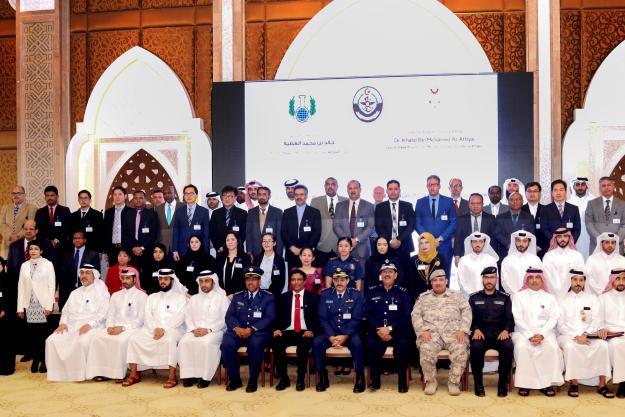
Participants at a Seminar on Chemical Safety and Security Management for OPCW Member States, held in Doha, Qatar
THE HAGUE, Netherlands — 16 March 2018 — Chemical safety and security specialists from Asia shared expertise and experiences during a seminar of the Organisation for the Prohibition of Chemical Weapons (OPCW), held in Doha, Qatar from 26 – 28 February.
The Seminar on Chemical Safety and Security Management for OPCW Member States in the Asian Region was organised in collaboration with the National Committee for the Prohibition of Weapons (NCPW) of Qatar.
In his opening statement, NCPW Secretary, Captain Abdul-Aziz Al-Ahmad, stressed that the event is taking place in the context of “the challenges facing the world in general, and our region in particular”. He underlined the significance of chemical safety and security for economic and technological development, as the “chemical industry is one of the most important pillars” of such growth.
OPCW’s Senior International Cooperation Officer, Mr Rohan Perera, stated in his opening speech that, “since its inception in 2012, the Chemical Safety and Security Programme in Doha has evolved into a leading international forum connecting top experts and serving the goal of strengthening chemical safety and security in Asia.”
Fifty-three participants represented National Authorities, chemical industry, industry associations, policy makers and academia.

Fifty-three participants represented National Authorities, chemical industry, industry associations, policy makers and academia.
The attendees shared their views on new approaches to various aspects of chemical safety and security, the development of national policy and legislation on chemical safety and security management including risk management, the role of academia in chemical processes safety management, vulnerability assessment and toxic waste management.
Attendees underlined the importance of practice-sharing, and education and outreach in building strong chemical safety and security worldwide.
The participants represented the following States Parties: Australia, Bangladesh, Cambodia, China, Indonesia, Iran, Iraq, Korea, Lebanon, Malaysia, Myanmar, Nepal, Oman, Pakistan, Philippines, Sri Lanka, Thailand, USA and Maldives.
Background
As the implementing body for the Chemical Weapons Convention, the OPCW oversees the global endeavour to permanently eliminate chemical weapons. Since the Convention’s entry into force in 1997 – with its 192 States Parties – it is the most successful disarmament treaty eliminating an entire class of weapons of mass destruction.
Over ninety-six per cent of all chemical weapon stockpiles declared by possessor States have been destroyed under OPCW verification. For its extensive efforts in eliminating chemical weapons, the OPCW received the 2013 Nobel Prize for Peace.
